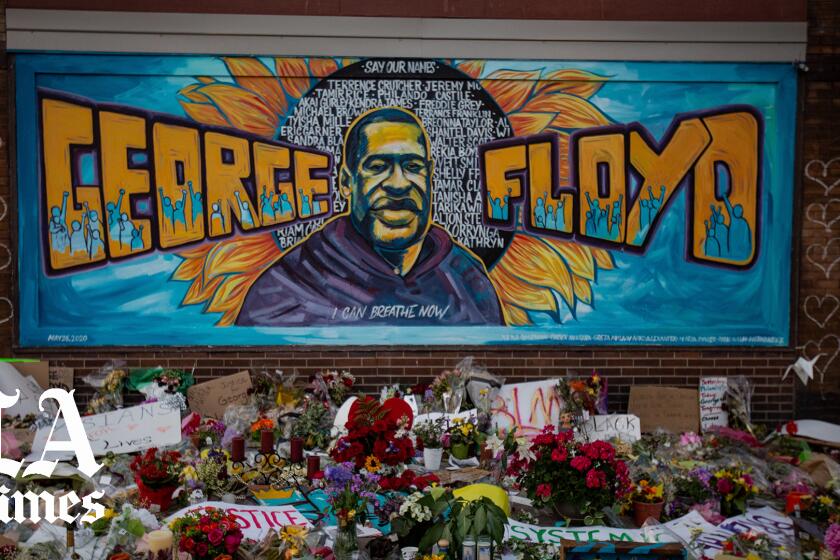Reparations are the answer to protesters’ demands for racial justice
- Share via
As protests continue to convulse cities across America, many wonder where we go from here. It’s impossible to know the future. But if efforts do not include meaningful reparations for African Americans, the omnipresent injustices we face will not be resolved.
For a long time, the word “reparations” was a non-starter, but it is finally losing its taboo. The movement to provide financial redress to African Americans for centuries of subjugation and racial terror was already growing last year. HR 40, a bill that would establish a commission to study the legacy of slavery and develop reparations proposals to Congress, is enjoying a surge in support. Groundbreaking reparations legislation has been approved in Evanston, Ill. And a bill has been introduced in the California Assembly that would create a task force to study the impact of slavery and offer proposals for reparations for African-Americans in the state.
The outpouring of anger in every corner of this country in recent days — more than 400 years after the first enslaved Africans arrived in America — could finally put reparative justice within reach.
The aversion to making amends for systemic racism is perhaps most evident in my hometown of Tulsa, Okla., which last week commemorated the 99th anniversary of the Greenwood massacre.
On May 31, 1921, thousands of white Tulsans, 2,000 of whom were deputized by the police, stormed the Greenwood neighborhood, a community known as “Black Wall Street.” In one day and night, the nation’s most prosperous black community was reduced to rubble. Hundreds were killed, and more than 10,000 black Tulsans were left injured, homeless and destitute.
For decades, Greenwood managed to flourish despite racist Jim Crow laws in Oklahoma. In a matter of hours, millions of dollars in hard-fought wealth — property, homes, businesses, investments — burned to ashes. About 35 square blocks, including 1,200 homes and scores of businesses, were destroyed. Tulsa has not been the same since.
Nearly 100 years later, Tulsa is still suffering from the legacy of that violence and racism. In the segregated city, more than 33% of residents in predominantly black North Tulsa live in poverty compared with less than 14% of residents in South Tulsa. Black Tulsans are subjected to police violence — such as the use of tasers and pepper spray — 2.7 times more than whites, according to Human Rights Watch.
For the African American community, the Greenwood massacre isn’t just history — it is felt to this day.
The difference in the arrests of Floyd and the four police officers involved in his killing shows why anger is filling America’s streets.
Take, for example, the story of my client Lessie Benningfield Randle, the last known survivor of the massacre still living in Tulsa. She recalled “seeing bodies in the streets” and having to flee from her grandmother’s house as the white people were “trying to kill all the black men.”
Most of the survivors were never able to recover financially from the devastation. Over the last century, Tulsa should have made amends for the bloodshed. Instead, the city engaged in a 75-year coverup so thorough that I didn’t learn my community was the site of a massacre until I got to college.
When Mother Randle turned 105 last year, she said there was one thing she wanted for her birthday: the restoration of her dilapidated home. Several prominent black residents of Tulsa raised funds to make it happen.
I visited Mother Randle in her home before the volunteers renovated it for her birthday. I found a disintegrating structure — the perfect metaphor for Tulsa’s refusal to accept real responsibility for the massacre and to deliver justice to its victims. Instead of inheriting Black Wall Street’s wealth, survivors like Mother Randle and their descendants inherited neglect, indifference and decades of obstruction from the city of Tulsa.
In 2000, a bipartisan panel of experts known as the Tulsa Race Riot Commission recommended that survivors, descendants and the community of Greenwood be paid cash in restitution. But Tulsa opposed payment, and the state issued decorative medals instead. A federal lawsuit filed on behalf of survivors a few years later was dismissed after the city hid behind a statute-of-limitations argument.
Recently, Tulsa Mayor G.T. Bynum dismissed the idea of monetary reparative justice, stating that it “divides the community around something we should be united around.” He is silent on why the community shouldn’t unite around Mother Randle’s struggle to be compensated for what was lost. He remains silent as a growing number of human rights organizations, and a new report from Human Rights Watch, have concluded that the racial disparities in Tulsa are dire, and reparations are overdue.
Meanwhile, in response to COVID-19, the city created the Resilience and Recovery Fund to provide interest-free loans to small businesses. Nonprofits are getting grants of up to $20,000 through the Vision Arts Resilience and Recovery Program. There is no doubt that our city’s small businesses and nonprofits deserve financial assistance now. But the decision to hand out cash is hardly something all Tulsans are united around, yet the city realized that it is the right thing to do.
It’s time for Tulsa officials do the right thing for racial justice and support reparations for victims like Mother Randle and their descendants.
At the national level, federal leaders need to support monetary redress for the intergenerational and continuing terror, trauma and economic discrimination inflicted on black Americans. The urgency of the protests across America shows that reforms won’t last unless we pay for the crimes of the past.
Damario Solomon Simmons is a civil rights attorney and an adjunct professor of African and African American studies at the University of Oklahoma.
More to Read
A cure for the common opinion
Get thought-provoking perspectives with our weekly newsletter.
You may occasionally receive promotional content from the Los Angeles Times.










